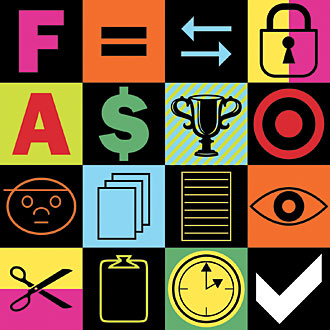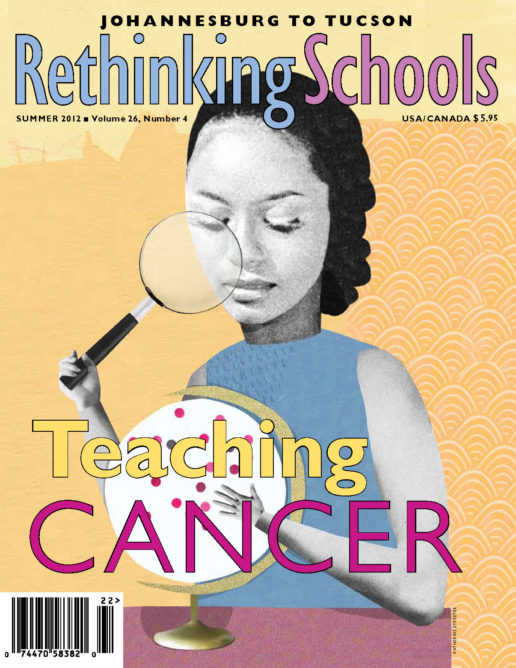Professional Development
New terrain for big business?
Illustrator: J. D. King

It has become increasingly popular to say that individual teachers are the single most important factor affecting student achievement. This is hastily followed by pointing out the need to weed out “the ineffectives.” Now this rallying cry is being used by educational consulting firms that position themselves as “partners in reform” to sell remedial, one-size-fits-all programs for professional development (PD). These canned PD programs contribute to a vicious cycle in which teachers appear to be failing and in perpetual need of more remediation.
One example is from Tennessee, which has a multimillion-dollar contract with one of these firms—Battelle for Kids (BFK), a “national, not-for-profit organization that provides strategic counsel and innovative solutions for today’s educational improvement challenges.” BFK has contracts in a dozen states and several countries, so BFK’s contract with Tennessee is an example of a much larger—and growing—problem with canned professional development.
As we warn against BFK’s “solutions,” we suggest that now is the time to rethink teacher PD. Systems of inequity in K-12 schools do not start and end with the school day. They are sustained by approaches that position teachers as failing, deficient, and in need of remediation, instead of as willing and capable of collaborating, investigating, and problem-solving. If students deserve a liberating pedagogy that empowers them to think independently and creatively, so do teachers.
PD as Big Business
Tennessee was a first-round winner in the Race to the Top (RTTT) competition. In Tennessee, and in most “winning” states, the tight timeline and large-scale changes required by RTTT (e.g., longitudinal data systems, revised teacher evaluation and support, and “turning around low-performing schools”) are beyond the capacity of existing state departments of education and require outside contracts to even begin. This has created a bonanza for educational consultants and service contractors. BFK’s contract with Tennessee alone reached into the tens of millions of dollars for the four-year RTTT period.
One aspect of this phenomenon is a growing trend toward outsourcing teacher PD to consulting firms whose inherent goal is to win the next state contract. As part of their overall contract with BFK, Tennessee bought the BFK•Learn™ Solution, which “is BFK’s online learning management service that provides educators access to online courses and personalized learning paths available any time, any place, and at any pace. . . . Using this solution, leaders can efficiently and effectively build the capacity of large, diverse user groups to address a variety of school improvement issues.”
BFK’s self-paced online courses provide introductory-level information to teachers about formative assessment and uses of assessment for instructional planning, a set of topics BFK has termed “formative instruction.” Teachers complete the online course at their own pace on their own time (outside of contracted hours). The estimated time for completion is 30 hours. As they complete the course, teachers answer multiple-choice questions to “check for understanding.” There are also spaces in the online course for extended responses and written reflections, but these sections are not graded and never reviewed. In fact, they are not even tracked by the system and thus can be left blank, incorrect, or incomplete without consequence.
The limits of the online modules are apparent in the design: They present written information and video scenarios, then require teachers to click a multiple-choice answer to demonstrate that they understand the material. Teachers are only assessed at the lowest levels of understanding (identify, apply, choose the best answer). Assessing understanding at this level doesn’t recognize the breadth of teacher knowledge, including local knowledge about students, communities, and school goals. More importantly, it can’t take into account the skill, motivation, and intention to apply content appropriately, flexibly, or expertly in practice.
The program does include some short-answer questions, but, like the reflection sections, these short-answer tasks are not graded. This is roughly the equivalent of requiring all high school math students to take a refresher course on addition and subtraction on the off chance that a deficiency in this area of foundational knowledge is still plaguing some of them. This is particularly problematic in states that plan to link their new evaluation system to PD. In a growing number of states, low evaluation scores will trigger the prescription of an online module to improve a specific aspect of practice. Although we are not indicting all online or self-guided learning, we do argue that answering multiple-choice questions cannot pass as development for professionals. It isn’t likely to improve teaching, and when it fails, it ensures the need for more “remediation” (and future potential contracts for BFK).
If there were some compelling evidence that no one currently teaching in Tennessee schools knew anything about formative instruction, it might make sense to provide everyone with what is essentially an overview of the uses of formative assessment to inform instructional decisions. However, there is compelling evidence that the opposite is true: All licensed teachers pass a test and/or hold a degree that says they understand this basic information. The BFK courses have titles like “overview of assessment for learning,” “an introduction to the five keys of quality classroom assessment with a focus on purpose,” and “clear learning targets.” If these sound familiar, it is because they are included in foundational standards for teacher candidates at any accredited degree-granting institution, required for advanced levels of teacher certification, and already tested by the Praxis II licensure tests required in 47 states. If teaching was about knowing at the level of a multiple-guess test, then Praxis tests would ensure an expert teaching force. We know this isn’t true.

The Alternative: High-Quality PD
In their studies of successfully reorganized remedial college courses, Gutierrez and colleagues (2009) argue that effective remediation “disrupts the ideology of pathology.” For teachers, this means—instead of emphasizing basic skills, which are individual problems—a collective approach that builds on existing teacher knowledge. PD should be an opportunity to analyze, discuss, and synthesize new strategies, to reconsider teachers’ relationships with their students and their entire school community. What might that look like?
Proponents of high-quality professional development, drawing on adult learning theories and supported by the research of the last decade (Darling-Hammond and Richardson, 2009; Garet et al., 2001; ), advocate for collaborative, sustained efforts that are embedded in the everyday practices of teachers and aligned with individual and school goals for progressive reform. PD, in other words, that:
- Focuses on content and pedagogy, not one or the other.
- Provides opportunities for application and active learning.
- Allows teachers to apply new knowledge and reflect on results with colleagues.
- Is based on collaboration.
- Is intensive and sustained over time.
- Is embedded and aligned with ongoing goals of the teacher and school.
Perhaps one of the main reasons these high-quality PD models have rarely been taken up at the district or state level is that there’s very little to buy—teachers, students, and community hold the knowledge, and conversations and practice are the sites of learning, not web portals. For example, within Critical Friends Groups and Professional Learning Communities, teachers come together to discuss student work and other evidence of student learning, the construction of curricula, and assessments that are part of their everyday work. Such forms of collaborative, embedded PD do not require buying a site license to access materials created by outside “experts” or paying registration fees for daylong “sit-n-get” lectures by talking heads charging exorbitant speaker’s fees. Likewise there is little to mandate. Authentic collaboration is built over time on trust, shared experience, and community.
We might take a lesson from the field of reading education, in which the only intervention program that has strong evidence of a positive impact on overall reading achievement (U.S. Department of Education, 2008) requires no commercial materials. This program, Reading Recovery, only requires a long-term investment in building individual teacher expertise through collaborative reflection on work with students. If deepening teacher expertise is the goal of any school reform effort, what is a district to buy? A paperback book describing collaborative reflection protocols? Or a multimillion-dollar contract for canned, online, workbook-style materials?
High-quality PD requires investment in the development of individual and collective expertise, not the mechanical accumulation of basic skills. Now is not the time to buy into models that can’t work. It should be a time to develop models for teacher learning that mirror our goals for the education of our students—models that encourage collaboration, reflection, and learning by analyzing, applying, synthesizing, and evaluating all the many things that count as “teacher knowledge.” Teachers, like students, are not empty vessels to be filled or, worse, “remediated” to become whole and effective. They are professionals who need the freedom, support, and inspiration to stretch, investigate, and broaden their practice with every new set of students.
Notes
Battelle for Kids, First to the Top: Tennessee Student Progress Portal, portal.battelleforkids.org/Tennessee/About/About_BFK.html.
Linda Darling-Hammond and Nikole Richardson, “Teacher Learning: What Matters?” Educational Leadership 66.5 (2009): 46–53.
Michael Garet et al., “What Makes Professional Development Effective? Results from a National Sample of Teachers,” American Educational Research Journal 38.4 (2001): 915–945.
Kris Gutierrez et al., “Re-Mediating Literacy: Culture, Difference and Learning for Students from Nondominant Communities,” Review of Research in Education 33.212 (2009): 213–246.
What Works Clearinghouse, Intervention Report: Reading Recovery, Washington, D.C.: U.S. Department of Education, 2008.

